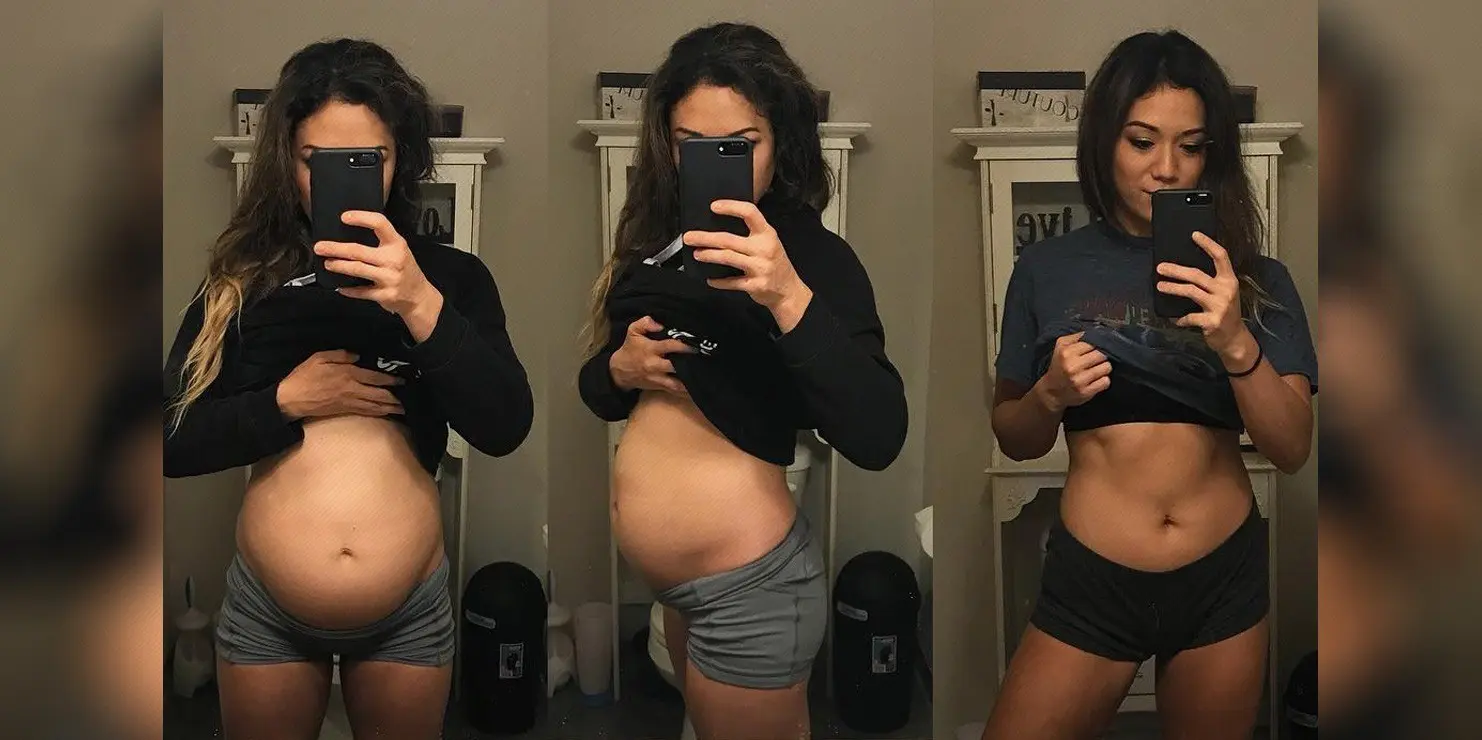A bodybuilder & figure competitor has revealed how eating certain foods can transform her six-pack into a protruding belly in minutes.
Michelle Middleton from Portland, Oregon transformed her body in 2015 after she ditched cardio and crash diets for weightlifting six times a week and a balanced diet of protein and carbs.
However, despite her new trim physique and virtuous lifestyle, she often suffers from extreme bloating.
Michelle Middleton’s impressive washboard stomach swells up in just minutes after she eats certain ‘trigger’ foods. The young woman ends up extremely bloated after eating products like yogurts, watermelon, broccoli, and asparagus.
She has released pictures to show how swollen her stomach gets – and says others are stunned by the extent of the bloating. In an Instagram post, she explained:
“When I say I’m bloated… I’m bloated,”
“I do these bloat posts every now and then but people still get surprised at how big my belly gets.”
“Yes I get bloated and it happens when I eat certain foods.”
Michelle added that her bloating happens when she eats certain foods — that aren’t’ part of her usual low FODMAP Diet.
The Low FODMAP Diet is often followed by people who suffer from Irritable Bowel Syndrome (IBS) or digestion disorders and bans foods such as asparagus, celery, sweet corn, dairy and most wheat-based products.
It focuses on cutting out short-chain carbohydrates which are poorly absorbed in the small intestine and can cause a host of digestive issues.
However, sometimes she deliberately eats foods that will leave her bloated.
“I pretty much know which foods are going to do it (high FODMAP) but sometimes I will eat it anyways,” Michelle wrote in the Instagram post.”
“Like earlier I had Greek yogurt and I got bloated within a few minutes but the bloat only lasted for a few hours and now I’m back to normal.”
She added:
“The foods that make me the most bloated are yogurts, protein powders, apples, pears, watermelon, broccoli, cauliflower and asparagus.”
The photo has since gone viral, and hundreds of women have taken to the comments section of the post to share their own bloating stories, and reveal the foods they avoid.
One wrote:
“Me too! It’s so crazy how much of a difference it makes eating certain foods.
“I honestly look 7kg heavier everywhere when I’m bloated — it’s so wild.”
User @kristindurley thanked the fitness enthusiast for her honesty and shared that she always thought she was suffering alone:
“I seriously thought I was the only one who bloats that much.
Some people say they are bloated and you can’t even tell, meanwhile I am over here looking five months pregnant! Solidarity”.
Admitting that she still struggles to stick to her diet, Michelle also shared in a separate post that prepping her food is key to meeting her nutrition goals.
She added:
“Nutrition is not my strong point. I can go to the gym every day, train hard, lift for hours, do cardio etc easy but trying to stick to my diet is the hardest thing I’ve ever done.
I looooove food so much. You just gotta think about your end goal and take it one day at a time.”
What is the low FODMAP diet?
- The low FODMAP diet was developed by a team at Monash University in Melbourne, Australia.
- FODMAPs are a collection of short-chain carbohydrates and sugar alcohols found in foods naturally or as food additives.
- It’s now been successfully adapted in the UK by researchers at King’s College London and implemented at Guy’s and St Thomas’ NHS Trust in London.
- FODMAP is an acronym for “Fermentable Oligosaccharides, Disaccharides, Monosaccharides, And Polyols” — Catchy, right?
- Put simply, these are sugars and carbohydrates that are poorly absorbed by the small intestine and digestive system — leaving them able to feed intestinal bacteria.
- As such, high FODMAP foods can fuel symptoms such as pain, bloating, and flatulence in people with Irritable Bowel Syndrome (IBS).
- The low FODMAP diet seeks to avoid these foods — a list which includes garlic, onions, cakes, and cheese.
Tip: If you're signed in to Google, tap Follow.











